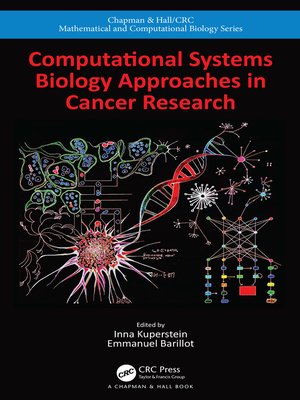Computational Systems Biology Approaches in Cancer Research
ebook ∣ Chapman & Hall/CRC Computational Biology
By Inna Kuperstein

Sign up to save your library
With an OverDrive account, you can save your favorite libraries for at-a-glance information about availability. Find out more about OverDrive accounts.
Find this title in Libby, the library reading app by OverDrive.



Search for a digital library with this title
Title found at these libraries:
| Library Name | Distance |
|---|---|
| Loading... |
Praise for Computational Systems BiologyApproaches in Cancer Research:
"Complex concepts are written clearly and with informative illustrations and useful links. The book is enjoyable to read yet provides sufficient depth to serve as a valuable resource for both students and faculty."
— Trey Ideker, Professor of Medicine, UC Xan Diego, School of Medicine
"This volume is attractive because it addresses important and timely topics for research and teaching on computational methods in cancer research. It covers a broad variety of approaches, exposes recent innovations in computational methods, and provides acces to source code and to dedicated interactive web sites."
— Yves Moreau, Department of Electrical Engineering, SysBioSys Centre for Computational Systems Biology, University of Leuven
With the availability of massive amounts of data in biology, the need for advanced computational tools and techniques is becoming increasingly important and key in understanding biology in disease and healthy states. This book focuses on computational systems biology approaches, with a particular lens on tackling one of the most challenging diseases - cancer. The book provides an important reference and teaching material in the field of computational biology in general and cancer systems biology in particular.
The book presents a list of modern approaches in systems biology with application to cancer research and beyond. It is structured in a didactic form such that the idea of each approach can easily be grasped from the short text and self-explanatory figures. The coverage of topics is diverse: from pathway resources, through methods for data analysis and single data analysis to drug response predictors, classifiers and image analysis using machine learning and artificial intelligence approaches.
Features
Applicationexample in each chapter
Online resources with useful applications'







